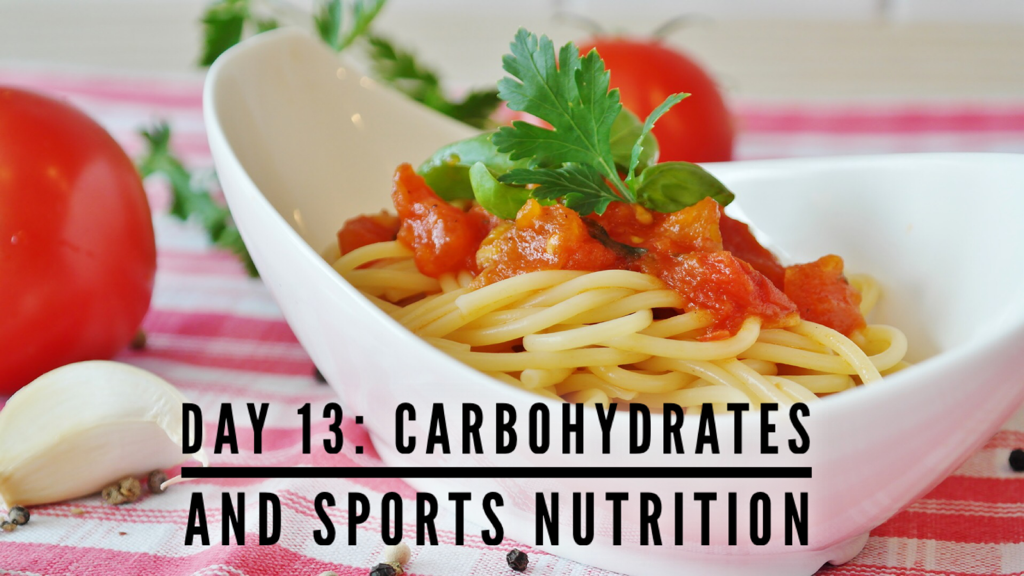Day 13: Carbohydrates and Sports Nutrition
Have you ever heard of carbohydrate loading? This is often done 24-36 hours prior to a running or cycling event. Runners or cyclists load up on complex form of carbohydrates to ensure they have enough glycogen stores in their muscles for optimum performance. Some would even advocate doing it during the week of the event.
Carbohydrate is the primary source of energy during moderate or intense physical activity. A study was done wherein subjects were given a high-fat diet and another group was given a high-carbohydrate diet and were made to cycle for two hours. Those who were on the high-fat diet complained of tiredness while the high-carbohydrate diet group performed better.
The recommended amount of carbohydrate for optimum performance is 1-4 gm/kg of carbohydrates (complex form) 1-4 hours before exercise.
If you are 50 kg, that would amount to about 50-200 gms of carbohydrates. One gram of carbohydrate yields 4 calories. So that would amount to about 200-800 calories.
If participating in an event that would demand moderate to high exertion, it is also recommended to increase carbohydrate intake at 10 gm/kg the day before the competition.
During exercise lasting more than 45 min, it’s also important to replenish the carbohydrate store by taking supplements in the form of glucose-fructose (2:1 ratio) at 90 gms/hour.
More importantly, 2-4 hours after exercise, one must replenish the glycogen store in the muscle at 1 gm/kg/hr. This will ensure that you will not have muscle wasting due to inadequate carbohydrate stores.
However, recently there are techniques that uses the low carbohydrate strategy during endurance exercise to train the body to maximize fatty acid oxidation. This is not recommended for more than 3 weeks because it is unhealthy and will eventually lead to depressed immune system.
So now you can see how your goal must be clear when it comes to exercise and nutrition. If you want to lose weight, you need to make sure you are consuming 500 less calories a day. If in addition to this goal, you also want to perform well and compete in a race, you may have a hard time balancing proper nutrition and calorie reduction. It would be better to lose weight first, and then optimize performance later when you’ve already achieved the weight that will not harm your joints and make exercising a tedious and miserable activity.
Low intensity exercises lasting less than 45 minutes should not make us feel entitled to consume more calories. The recommendations for carbohydrate loading are for athletes and people who train under moderate to high intensity for more than 45 minutes.
For more information on Carbohydrate Availability and Physical Performance: Physiological Overview and Practical Recommendations, click on the link below:
https://www.ncbi.nlm.nih.gov/pmc/articles/PMC6566225/
Carbohydrate is the primary source of energy during moderate or intense physical activity. A study was done wherein subjects were given a high-fat diet and another group was given a high-carbohydrate diet and were made to cycle for two hours. Those who were on the high-fat diet complained of tiredness while the high-carbohydrate diet group performed better.
The recommended amount of carbohydrate for optimum performance is 1-4 gm/kg of carbohydrates (complex form) 1-4 hours before exercise.
If you are 50 kg, that would amount to about 50-200 gms of carbohydrates. One gram of carbohydrate yields 4 calories. So that would amount to about 200-800 calories.
If participating in an event that would demand moderate to high exertion, it is also recommended to increase carbohydrate intake at 10 gm/kg the day before the competition.
During exercise lasting more than 45 min, it’s also important to replenish the carbohydrate store by taking supplements in the form of glucose-fructose (2:1 ratio) at 90 gms/hour.
More importantly, 2-4 hours after exercise, one must replenish the glycogen store in the muscle at 1 gm/kg/hr. This will ensure that you will not have muscle wasting due to inadequate carbohydrate stores.
However, recently there are techniques that uses the low carbohydrate strategy during endurance exercise to train the body to maximize fatty acid oxidation. This is not recommended for more than 3 weeks because it is unhealthy and will eventually lead to depressed immune system.
So now you can see how your goal must be clear when it comes to exercise and nutrition. If you want to lose weight, you need to make sure you are consuming 500 less calories a day. If in addition to this goal, you also want to perform well and compete in a race, you may have a hard time balancing proper nutrition and calorie reduction. It would be better to lose weight first, and then optimize performance later when you’ve already achieved the weight that will not harm your joints and make exercising a tedious and miserable activity.
Low intensity exercises lasting less than 45 minutes should not make us feel entitled to consume more calories. The recommendations for carbohydrate loading are for athletes and people who train under moderate to high intensity for more than 45 minutes.
For more information on Carbohydrate Availability and Physical Performance: Physiological Overview and Practical Recommendations, click on the link below:
https://www.ncbi.nlm.nih.gov/pmc/articles/PMC6566225/

